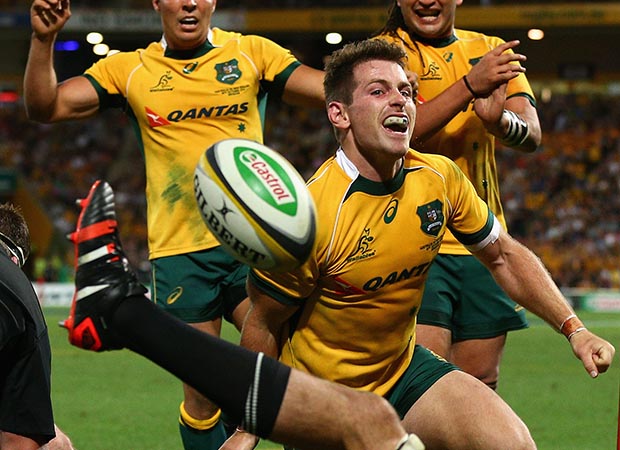 New Zealand will not be panicking as much as Australia about the talent drain to Top 14, Premiership and Pro12 clubs just yet because there is so much talent in their Super 15 teams, and the likelihood of anyone of 26 or under leaving for Europe is minimal.
New Zealand will not be panicking as much as Australia about the talent drain to Top 14, Premiership and Pro12 clubs just yet because there is so much talent in their Super 15 teams, and the likelihood of anyone of 26 or under leaving for Europe is minimal.
That's because most New Zealand players who are on the way up, or at the top of their game, still want to win All Black Test caps and play in winning World Cup teams. It was much the same when I was 23, because I wanted to play for England, and I know that in the same situation the Kiwis are in I wouldn't have jeopardised that.
The fact that England players now might earn as much as £500,000 a year by staying at home and sleeping in their own beds would have made it even easier to stay put.
The All Blacks are in a similar situation, and the New Zealand Union looks after their big names pretty competitively and have allowed chosen players like Dan Carter to go on sabbaticals to take up contracts in Japan and France. The amount of money available for a short season in Japan – which doesn't disrupt the All Black Test schedule – is pretty tempting for players, and so the NZ coaches make some allowances, as they did with Jerome Kaino.
With plenty of Southern Hemisphere players now being capped at 20 or 21 and therefore having 50 caps by the time they are 26, and possibly having played in two World Cups – and maybe won one – you can understand their desire to earn big money and experience life and rugby in another country. But, until that time, most of them will stay put.
Charles Piutau is an exception, and the 23-year-old All Black winger has caused a big stir by leaving the silver fern jersey behind and going to Ulster. However, there will always be exceptions, and we don't know Piutau's family circumstances. He might be supporting them in the same way Wallaby wing Nick Cummins was when he left Western Force for a season in Japan.
The other high-profile All Black heading to Europe is 27-year-old fly-half Colin Slade, who is joining Conrad Smith (33) at Pau. Slade has been playing in the shadow of Carter and more recently Aaron Cruden and Beauden Barrett. Those three have shared the All Black No.10 shirt between them during the last few seasons not really allowing Slade to get a chance, and that will have dictated the timing of his move north.
Slade is having a fantastic season at 10 for the Crusaders, pushing Carter out to 12, and on current form he deserves to start, or at the very least be on the bench, for the opening internationals in the Rugby Championship. However, now he's stated his intention to join Pau after RWC 2015 I'm not sure Steve Hansen will select him, even with Cruden injured and Carter – who's on his way to Racing Metro after the World Cup – struggling for form.
That scenario of Hansen not picking Slade would be no different to the selection embargo of Stuart Lancaster not picking Steffon Armitage for England. He's playing the best, but he's not going to be picked because he's not going to be playing in the right country.
While some New Zealanders will believe Slade and Piutau are passing up the opportunity to represent their national team during the best playing years of their careers, times are changing. They might have had a point if this was 15 years ago, but the game is professional and it's a short earning career for most. That means for some players all options are open to consideration.
The situation for Australia is different. The Australian Union's decision this week to relax their regulations and allow overseas-based Test players with 60 caps, or seven seasons of Super Rugby, to be eligible again for the Wallabies was needs-must.
The ARU are in a poor financial state and Rugby Union in Australia has a much lower profile than it does in New Zealand and South Africa, where it is still a leading sport in terms of profile and popularity.
Unless Australia find a financial solution they may have to adapt further, with the 60 cap ruling reduced to 50, 40 or even 30. It's a good thing that the Aussies are innovative because their first big challenge is to construct a conveyor belt of 16, 17 and 18-year-olds who want to play for their country.
They could do worse than look at the model used by Bayern Munich, Germany's biggest football club. I saw a documentary recently where Owen Hargreaves, the England player developed by Bayern's unbelievably successful academy, highlighted how they do it.
He identified the ex-Bayern players involved in coaching, selecting and mentoring the academy players as a key factor in how they produce huge numbers of players continuously for the club and for the world champion German side.
The Reds, Waratahs, Brumbies, Western Force and Rebels have to create their own versions of that Bayern environment. Then they will have players who want to reward the environment that gave them so much with loyalty.
So much of sporting success is about the environment that's created, and that's the best antidote to the player-drain crisis the Australian Rugby Union could face after the 2015 World Cup. However, sabbaticals for star players can also provide a short-term fix.
The ARU have already given Wallaby and Waratahs fly-half Bernard Foley a “flexible contract” which allows him to play in Japan and, in the same season, continue to play for Australia. Before that no Aussie player not playing in the Super 15 could play for the Wallabies. It will be interesting to see whether flexible contracts are also introduced for Wallaby players who are outside the 60-cap/seven-year exemption but move to European clubs.
It was critical for the Australian rugby administration to compromise because their pro playing resources are small, and this sends the message to their best players that they can have the best opportunities and still play for their national team.
The ARU have had to negotiate with their elite players because Rugby Union has huge competition from Rugby League, Aussie Rules and cricket in terms of financial support via TV revenue. If Australia lose their best talent they cannot attract big TV deals or sponsors, and the game there will die without the requisite financial support.



























